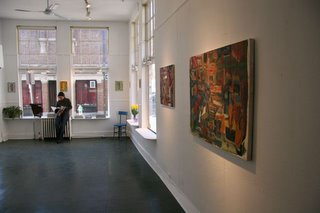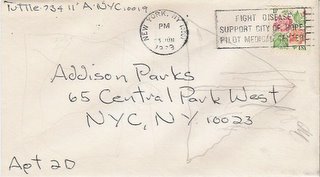Historically speaking, Rauschenberg has nothing to worry about. He's a supernova in his own lifetime, a heavy hitter, a HEAVY weight. Yves Klein is not in his class. Still, "comparing and contrasting" the two, as we are invited to do by the French art establishment, was inevitable. Impossible to avoid. So pull out your score cards and let us begin!

Rauschenberg looked great. I mean GREAT. Beautiful work, beautiful installation. Rock solid. If not all the pieces we've come to know and love, most of them were there. By Job he looked like the master! Rauschenberg 1, Klein 0
Next door, however, Klein immediately took the advantage. SURPRISE? He was given the nicer space. Larger rooms, more beautiful and better flowing space, and windows, which let the space breathe. Rauschenberg's space felt like a closet. So chalk one up for the Frenchman. Klein 1, Rauschenberg 1
The thing about Rauschenberg looking great was a double-edged sword, unfortunately. The work looked too museum worthy despite its whole "happening" history. It certainly seemed "happening" in its day, but now it looked more calculating, like he knew exactly what he was doing. Klein, on the other hand, looked positively breezy; alive; daring; even hit or miss. But his hits looked fresh from the market, even today. Score a big one for Klein! What a surprise!
Most of this work is from the Fifties and early Sixties. I won't talk about what that means. Museums( the Louvre is close by) have a way of looking like mausoleums. Rauschenberg ended up looking like Rembrandt, not like anything we might find in one of the ICAs of the world. We might learn from him the way we would learn from Poussin. Maybe even down on our knees in front of the master. Now maybe it was the installation, the lighting, but the work looked that old and yellowed. Is that bad? It felt that way. Again, I was surprised and disappointed. I remember going to the Johns show at the old MoMA and feeling like the light had gone out of the work, work I loved. These guys had been heroes of mine as a teen in the Sixties. But not Klein. He seemed like some kind of showman/charlatan, giving his peers a bad name.
I have to add quickly that the taste question is another surprise. You figure the Frenchman is the one who is going to get bogged down in such bloody good taste. NO! Rauschenberg is the surprisingly tasteful one, it is just so hard to see past his rebellious nature. The work looks downright ugly most of the time, but the taste quotient is through the roof. Everything is so tastefully considered(too?) it is a wonder he could find the time to do what he did. The taste is furious! Fast as a cake walk. NOTHING is left to chance. Everything is immaculately considered. Calculated. Made to get him past or around or even up with de Kooning, Rothko, and Pollock.
Now Klein looked pretty damned good. Not at first, mind you. Still in the glow of Rauschenberg he looked shallow. Flat. One-dimensional. The same over and over again. Even slick. But then something happened I could not get around. Something I couldn't dismiss to preserve my old hero.

There is a famous picture of Klein that the Pompidou Center used to advertise the exhibition. They put it on posters, cards, and books. It shows him flying out the window with the sidewalk waiting for him. It it positively glorious. Icarus. His head is held high and thrusting forward, arms spread like wings to his sides, back arched and body behind him like a bird. It is the picture of the artist. The individual. The fool. The hero. The artist. Everything that it means. It is wonderful!

That thing I couldn't get around was that in Klein's paintings, almost prints, made by rolling naked women(yes, so FRENCH!) in his signature blue paint(IKB) and then on blank canvas, things did happen! Real accidents, visual mysteries that you couldn't put a finger on, just experience. These were REAL happening paintings. Yes, Klein was a conceptual artist, one of the first of his age, and not a painter, per se, but these paintings are paintings precisely because they are light as a feather. With a whimsical detachment that frees them. Almost like the sort of thing that kids make with spin art. Crap shoots. The kinds of things people find too easy to dismiss. Too just beautiful. But they got me. They flew through the air. THEY SOARED! Surrendering to them was an experience that slapped me in the face like a biting winter wind. And it woke me up! With a smile. I needed that! But maybe that's not art.
Maybe Rauschenberg wins for art. Maybe he IS the master. And maybe Klein was just a life thing. Too caught up in his blue freedom to carve out his place in art history. But give me life everytime!








